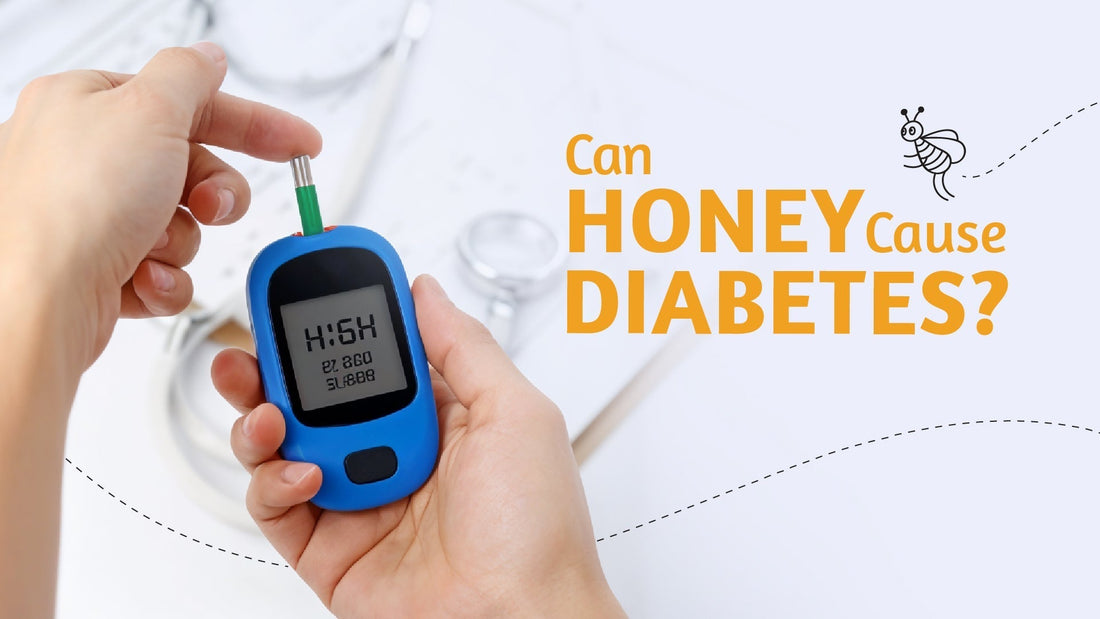Diabetes is a global health issue, with rising cases largely linked to lifestyle choices, particularly diet. Sugar intake is one of the main dietary factors influencing blood sugar levels, leading many to explore natural alternatives like honey. With its sweet taste and potential health benefits, honey is often seen as a healthier option than sugar. But is honey truly safer for those with diabetes, or could it pose similar risks?
Honey vs. Sugar: Understanding the Basics
Sugar and Honey Composition
Both honey and sugar contain glucose and fructose, though in different ratios. Table sugar, or sucrose, is a disaccharide composed of equal parts glucose and fructose. Honey, on the other hand, contains more fructose than glucose and is primarily a mixture of these two simple sugars.
Glycemic Index (GI)
The glycemic index measures how foods affect blood sugar levels. Foods with a high GI can cause rapid blood sugar spikes, while those with a low GI are absorbed more slowly. Honey has a lower GI than table sugar, which generally raises blood sugar more gradually. This quality often makes honey a preferred option for those monitoring their glucose levels, but it still requires careful portion control.
Can Honey Cause Diabetes?
While truly raw honey is natural, it still contains sugar. Regular, excessive consumption of any sugar source, including honey, can lead to weight gain and potentially raise the risk of developing type 2 diabetes, particularly if paired with other risk factors like a sedentary lifestyle and poor diet.
Honey doesn’t directly cause diabetes, but overconsumption can contribute to blood sugar fluctuations. It’s best to think of honey as a slightly better alternative to refined sugar, not as a cure-all or “safe” sweetener. Moderation remains essential.
Honey, like other sugars, can contribute to higher blood sugar levels if consumed in excess. However, when consumed in moderation, it can be part of a balanced diet without causing diabetes.
Is honey better than sugar for people with diabetes?
Ans. Honey has a lower glycemic index than regular sugar, but it still affects blood sugar levels. It should be consumed in moderation by people with diabetes.
Can honey help manage diabetes?
Ans. Some studies suggest honey may have health benefits, including antioxidant properties, but it should not be relied upon as a primary treatment for diabetes. Always consult a doctor.
Benefits of Honey & Neem Flower Honey for Diabetics
Honey, despite its natural sugar content, offers advantages over refined sugar for people with diabetes.
Lower Glycemic Impact
Honey has a lower glycemic index (GI) than table sugar, causing a slower and more gradual rise in blood sugar. When consumed in moderation, it may help diabetics maintain more stable blood sugar levels.
Rich in Antioxidants
Loaded with antioxidants like quercetin and flavonoids, honey helps combat oxidative stress and inflammation—common concerns for diabetics.
Wound-Healing and Antimicrobial Effects
Honey’s antimicrobial properties make it effective for managing slow-healing wounds, a frequent issue in diabetics. It aids in preventing infections and promoting faster healing.
The Benefits of HoneyAllDay Neem Flower Honey for Diabetics
HoneyAllDay’s Neem Flower Honey, sourced from nectar collected from neem blossoms, offers additional advantages:
Lower GI: With an even lower glycemic index than regular honey, Neem Flower Honey is especially suitable for diabetics seeking better blood sugar control.
Anti-Inflammatory and Antibacterial: Neem’s medicinal qualities enhance this honey’s ability to reduce inflammation and fight infections.
Rich in Nutrients: Packed with essential nutrients, antioxidants, and trace minerals, Neem Flower Honey supports overall health.
Note: Neem Flower Honey has a distinctive bitter aftertaste, reflecting its rich medicinal properties.
The Value of Truly Raw, Cold-Processed Honey
Most honey on the market today is pasteurized or heat-treated, which can reduce or eliminate its natural enzymes, antioxidants, and other beneficial compounds. HoneyAllDay is India’s 1st cold-processed honey, meaning it retains its raw, unprocessed qualities.
Why Cold-Processing Matters
Cold processing ensures that honey’s beneficial properties, including its antioxidant levels, remain intact. This makes HoneyAllDay a better choice for diabetics compared to regular pasteurized honey, which often loses its natural nutrients through heat treatment. Additionally, HoneyAllDay’s cold-processing method keeps the honey free from additives and adulteration, making it a pure, natural choice.
Research on Honey and Diabetes
Several studies have explored honey’s effect on blood sugar levels. Some research suggests honey may cause a slower increase in blood sugar compared to other sweeteners, though results vary depending on the individual and type of diabetes. For instance, a few studies indicate honey may improve insulin sensitivity slightly in some individuals, potentially making it a beneficial alternative in very limited amounts. However, more research is needed to confirm these benefits.
How to Safely Incorporate Honey in a Diabetic Diet
If you have diabetes and wish to use honey, consider these tips to minimize blood sugar spikes:
- Use Small Amounts: Limit honey to very small servings, as even natural sugars can impact blood glucose.
- Pair with Fiber-Rich Foods: Fiber slows down glucose absorption, so pairing honey with fibre-rich foods can help maintain stable blood sugar levels.
Examples include -
- Greek Yogurt Bowl: Add a teaspoon of honey to unsweetened Greek yoghurt with fibre-rich toppings like granola, walnuts, and diced apples.
- Smoothies: Sweeten a green smoothie made with spinach, cucumber, and fibre-rich fruits like pears or bananas using a small quantity of honey.
- Chia Pudding: Stir honey into a chia pudding made with almond milk and topped with kiwi slices or pomegranate seeds.
- Honey and Oatmeal- Add a teaspoon of honey to a bowl of unsweetened oatmeal topped with fresh fruits like berries or sliced apples for a fibre-packed, balanced breakfast.
- Monitor Blood Sugar: Keep an eye on your blood sugar levels when introducing honey into your diet and discuss any dietary changes with a healthcare provider.
Is Honey Safe for Diabetics?
While honey can be a natural alternative to sugar, diabetics need to use it cautiously. Consulting a healthcare provider before adding honey to a diabetic diet is highly recommended, as individual responses vary. For those with uncontrolled diabetes or high blood sugar levels, even honey might not be suitable.
Can honey cause diabetes?
Honey, like other sugars, can contribute to higher blood sugar levels if consumed in excess. However, when consumed in moderation, it can be part of a balanced diet without causing diabetes.
Is honey better than sugar for people with diabetes?
Ans. Honey has a lower glycemic index than regular sugar, but it still affects blood sugar levels. It should be consumed in moderation by people with diabetes.
Can honey help manage diabetes?
Ans. Some studies suggest honey may have health benefits, including antioxidant properties, but it should not be relied upon as a primary treatment for diabetes. Always consult a doctor.
Conclusion
Honey may offer some advantages over refined sugar for people with diabetes, particularly with its lower GI and antioxidant properties. However, it should be used sparingly and carefully monitored to avoid significant impacts on blood sugar levels. Always seek guidance from a healthcare provider before making any dietary changes, and remember that a balanced diet and an active lifestyle are key components to managing diabetes.





